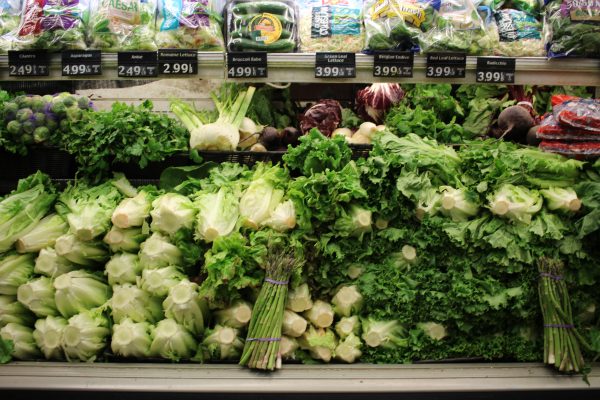Athletes, Don’t Forget Your Vegetables
Students can look towards purchasing more healthy groceries off campus. (JESS LUSZCZYK/THE OBSERVER)
October 14, 2016
The importance of eating healthy is often overlooked by athletes. As a former athlete, I often thought that since I was burning calories through playing sports, I could eat whatever I wanted. Yet the impact that eating healthy has on one’s athletic performance is profound. Whether playing a sport or simply being regularly active, incorporating green vegetables into one’s diet can directly boost one’s athletic performance.
Take Venus and Serena Williams, world-renowned tennis players, for example. These sisters follow a raw vegan diet during their tennis season. As a result of being diagnosed with Sjögren’s syndrome in 2011, Venus’ doctor recommended a vegan diet to counter her most prevalent symptom: fatigue. In solidarity, Serena joined her. When asked what she eats, Venus told Glamour Health Magazine, “I eat mostly healthy. Lots of vegetables and green juices—good sources of carbohydrates and proteins, like beans and lentils. I have big salads with raw vegetables. Lots of good stuff.” Subsequently, the Williams sisters’ remarkable accomplishments speak volumes, claiming their sixth Wimbledon doubles title and 14th doubles Grand Slam in July of this year. Serena even won the 2016 Wimbledon championship, making that her 22nd Grand Slam title. Achievements aside, their stunning physique gives us all plenty of body envy.
Countless health benefits are rooted in just the nutrients and vitamins found in green vegetables and dark leafy greens. Fiber, which can be found in such vegetables, is the key to healthy digestion, as it allows the body to eliminate waste quickly and effectively. Therefore, high fiber intake can lead to a healthier weight, in which athletes focus on maintaining. The high amount of Vitamin K and calcium found in vegetables contributes to bone health, greatly lowering the risk of injury. Lutein and zeaxanthin, also found in dark leafy greens gives athletes heightened visual awareness when playing sports.
Highly processed foods do nothing but harm the body, as they are low in nutrients and loaded with added sugar. Robert Madden, Ph.D. and lecturer in biology at Fordham University. said, “A difficulty with the modern American diet, which is often high in processed foods, is too many empty calories. That is, with high fat and carbohydrate content, they meet caloric needs, but are deficient in other nutrients.” Such processed foods, like breakfast cereals, cheese and potato chips, sabotage our diets with unhealthy fats. Consuming vegetables instead complements the body in greater ways.
Madden continued, “Vegetables typically contain substantial amounts of vitamins, minerals and fiber relative to caloric content.” He continued, “Therefore including vegetables in the diet increases the intake of these important nutrients while making a smaller contribution to caloric intake than is true for many processed foods.” The perpetual list of nutrients found in vegetables is exceptional, as are the benefits to athletes.
Protein is an athlete’s source of fuel and can be consumed in a variety of ways. Protein shakes, seemingly the holy grail of protein in every male athlete’s life, are not the greatest source. These shakes are often incredibly high in calories and are commonly used as meal substitutes, yet they are specifically high in protein and thus unreliable as a complete source of nutrition. Meat, also praised as being a go-to source of protein, falls short in many ways. Loaded with salt and chemicals, meat opens the door to numerous health complications such as heart disease and cancer. Surprisingly, broccoli actually contains more protein per calorie than beef does, and is cruelty-free, on top of that. Additionally, it provides a plethora of fiber, amino acids and vitamin B6. Students should take this into account before turning a blind eye to broccoli and other protein-packed vegetables.
Considering the number of athletes at Fordham University, it is important to examine how eating green vegetables can complement your performance. Activity aside, eating vegetables, green or not, is one of the best things you can do for your body. Fordham University Dietitian Melanie Simeone stated that eating green vegetables long term “usually results in a healthier digestive tract, healthier body weight (assuming balance with other nutrients and calories) and fewer nutrient deficiencies.”
This continual consumption is certainly not as difficult as it seems, either. Simeone recommends simple tasks such as adding vegetables to an omelet, choosing veggie pizza and swapping french fries for a baked potato. With a creative spin and a positive attitude on how you eat vegetables, they can be incorporated into your diet with ease, destroying the limits on athletic success.









